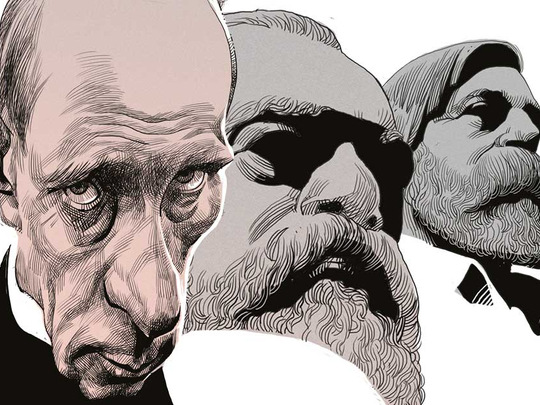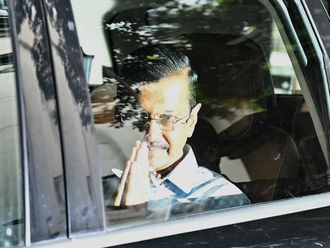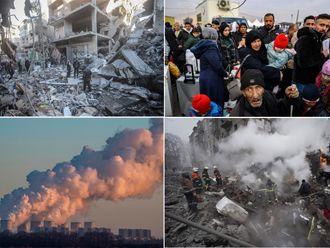
Standing in the heart of Manchester in the United Kingdom, what struck me as rather unusual and even odd to some extent was a larger-than-life statue of Friedrich Engels. With an abundance of opulence all around at the commercial centre called Home, on First Street, Engels’ ‘presence’ was a bit of an oxymoron for me, so to speak. But soon I realised that the statue was perhaps in the fitness of things — an objective correlative for a stark reminder and a word of caution for the ills of mindless materialism and a consumerist culture that can only strengthen the hands of an imperialist and neo-colonialist clan. Karl Marx, with whom Engels had collaborated for their historic treatise The Communist Manifesto, had propounded that the state, as a tool of coercion, shall eventually wither away as socialism and dictatorship of the proletariat pave the way for an egalitarian order.
The ideas of both Marx and Engels had a profound impact on the way the November Revolution struck a chord with the masses in the erstwhile Soviet Union. Starting with the Bolshevik Revolution of 1917 — under the stewardship of Vladimir Lenin — and until the late 1980s, when Mikhail Gorbachev was practically ‘overseeing’ a ‘withering away’ of the state shaped by Bolshevism, the Soviet Union and Russia have always been a test case for the applied dynamics of Marxism and Leninism.
Given such a historical progression, the emergence of Vladimir Putin — particularly in light of his recent election victory — is an antithesis to and an extreme demystification of a Marxist-Leninist school of thought.
When the basic tenets of Marxism put forward the idea of ‘withering away of the state’, there was one unspoken ‘given’ in that theorem: The state isn’t the statesman. And Lenin had very assiduously maintained that principle all through his political career. What contemporary Russia is going through under the leadership of Putin is a further demystification of Marxist ideology on the lines of a Stalinist paranoia. By virtually perpetuating his political authority over the Russian state, Putin’s clarion call is one of reclaiming lost geopolitical and ideological territory in a post-Cold War era, where the Russian state and its statesman have been baked into one monolithic entity. And what better way to do that than make the most of an America that is ready to cede political and economic ground to emerging powers and to its Cold War-era rival.
That is precisely where lies a huge problem for not only contemporary Russia, but for a post-Cold War world hobbled by American abdication on one hand and extreme Russian revanchism on the other.
Ideological bankruptcy of the West
In every major geo-strategic theatre that is currently active around the globe, Russia has managed a toehold — and on its own terms: From annexation of Crimea to helping a pugnacious Bashar Al Assad stay in power in Syria; from playing peekaboo on the United Nations Security Council over the issue of sanctions on North Korea to the alleged poisoning of a double agent in Britain … there are examples galore — the denials notwithstanding. If a post-Cold War, unipolar world has primarily been one coloured and textured by American hegemony and boorish one-upmanship, then countering that with extreme revanchism has been the hallmark of a Putin-era Russia that has sought to maximise the benefits from a ‘more-wronged-than-wrong’ image.
Almost all of us who have grown up on a heavy diet of James Bond movies are aware of the monochromatic portrayal of Russia by Hollywood as all things evil. Such one-track, linear projection of Russia as the archetypal ‘villain’ speaks volumes about the fault lines and the ideological bankruptcy that characterise the West’s highly flawed conceptual-construct of a rival global power. There’s no escaping that reality at all. But on the other hand, we are confronted with something equally repelling: That of a Russian discourse that’s heavy on cheap thrills, a foreign policy template that’s tooled with the art and craft of a reactionary module that doesn’t miss out on a single opportunity to belittle all things ‘western’.
It is indeed unfortunate that while the United States, under a Donald Trump presidency, has sought to promote its jingoistic and utterly vacuous “America First” policy, the huge vacuum in terms of a visionary global leadership has been sought to be filled up with the language and machinations of a street fighter — not with the wisdom and sagacity of a superpower befitting its stature. True, every global power has its own stakes in the great-power games to cater to and every nation has its own foreign policy priorities and limitations to contend with. In that sense, if “America First” is a prerogative of a Trump White House to pledge its commitment to an insecure, inward-looking America, then the ‘Belt-and-Road’ grand plan of President Xi Jinping’s China is an ambitious pursuit in all fairness. And so it is with Putin’s Russia, to doggedly try and restrict Nato’s military, political and economic influences on the eastern and northern fringes of Europe to a bare minimum. But the point is, even though foreign policy is a zero-sum game, the concomitant responsibility and accountability parameters cannot simply be airbrushed for one’s convenience.
Queering the pitch in Middle East
To cite just one example: Abdication of American responsibility from the quagmire that the Middle East is, can surely be interpreted as a step aimed at earning plaudits from a domestic audience. And that presented Moscow with a golden opportunity to assert its authority in Middle Eastern geo-politics like never before. But securing the future of its warm-water naval bases in Syria is one thing and fortifying the future of a regime that subjects its own population to genocidal excesses is something quite the other. Instead of being an honest broker of peace, what Putin-era Russia has managed to do is queer the pitch perhaps forever in the Middle Eastern theatre of gore. It will be really interesting to find out how many unarmed civilian deaths have been reported in Syria and neighbouring Iraq in the name of decimating Daesh terrorists.
Given the way the entire Syrian crisis has played out over the last couple of years, following Russian intervention in particular, one cannot but take strong umbrage to the fact that massacres of civilian populations have come to be accepted as mere collateral damage in a great-power game. It is similarly reviling to note how a Russian-made Buk missile was used to shoot down Malaysia Airlines Flight MH17 over Russian separatist-controlled territory in Ukraine on July 17, 2014, and the subsequent reported Russian reluctance to cooperate with the Dutch Safety Board inquiry. Applying Novichok, a dreaded Second World War-era nerve agent, on double agent Sergei Skripal in Salisbury, Britain, earlier this month, smacks of the same great-power rivalry gone awfully wrong. Kremlin has referred to the allegations as “bordering on banditry”, but there ought to be a stronger fact-based rebuttal.
As the sixth-largest economy in the world in terms of purchasing power parity, possessing one of the largest reserves of oil and natural gas, and a rich repository of culture and the performing arts, there are myriads of ways in which Russia can and should be able to capture the imagination of the world. Unfortunately, in his determination to play hardball with the West, Putin may have lost sight of the immense possibilities of Russian soft power that have strangely remained under-utilised since the days of yore. If Engels’ statue in Manchester is a reminder of the ills of capitalism, then a Putin presidency is a cautionary tale on the dangers of a great-power matrix that has gone off the books.
You can follow Sanjib Kumar Das on Twitter: @moumiayush.



_resources1_16a45059ca3_small.jpg)






